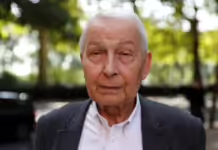
Calday Grange grammar school welcomed UK Testicular Cancer charity The Oddballs Foundation this month.
James Hirst, one of the charity’s student ambassadors, went into the school to talk to the students about the basics of testicular cancer.
Walking them through how to properly ‘check your balls’, James explained the signs and symptoms, as well as the initial diagnosis for testicular cancer.

One of the main ways Oddballs delivers their message is through the University Ambassador Programme.
The University Ambassadors visit schools, universities and workplaces, delivering talks on Testicular Cancer, reminding boys and men to check their balls – and removing any stigma and embarrassment about it.
They also fit Check Yourself Guides into public spaces and workplaces. In 2018, they appointed the first five ambassadors in Bath, Cardiff, Durham, Exeter and Loughborough.
Now the Foundation has 50 ambassadors ranging all over the UK and Ireland.

The Oddballs Foundation use their Oddballs merch as a bright and colourful talking piece as a way to provoke a conversation regarding testicular cancer.
Here are 10 facts that The Oddballs Foundation promote:
- Around 2,300 men are diagnosed with Testicular Cancer each year in the UK.
- Testicular Cancer is unusual compared with other cancers because it tends to affect younger men.
- Testicular Cancer is the most common type of cancer to affect men between the ages of 15 – 49.
- The exact cause or causes of Testicular Cancer are unknown, but a number of factors have been identified that increase a man’s risk of developing it, including undescended testicles, family history, and having previously experienced Testicular Cancer.
- Testicular Cancer is one of the most treatable types of cancer, and the outlook is one of the best for cancers.
- Typical symptoms are a painless swelling or lump in one of the testicles, or any change in shape or texture of the testicles.
- See a GP immediately if you notice a swelling, lump or any other change in one of your testicles.
- Treatment for Testicular Cancer is much more effective when started early.
- Chemotherapy, radiotherapy and surgery are the three main treatments for Testicular Cancer.
- Survival of Testicular Cancer is very high. Nearly all men survive their disease.
Watch MerseyNewsLive’s video report here:
Featured image (c) James Hirst












